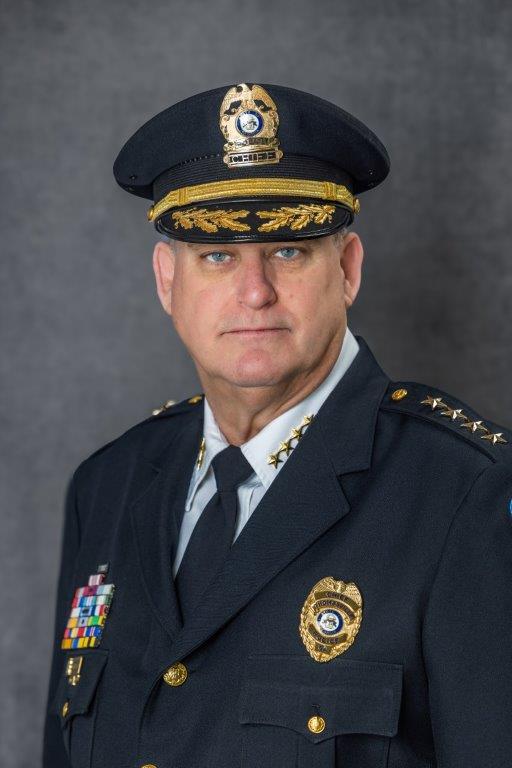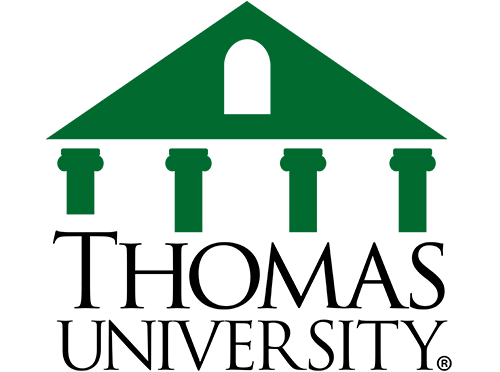Thomas University Alumnus Named New Thomasville Police Chief
Post Published On:From making siren noises as a child on his family farm to the pinnacle of the Thomasville Police Department, Thomas University alumnus Roger Wade Glover was appointed the new Police Chief of Thomasville.
Glover was named the City’s Police Chief in February after serving as Major in the police department’s Support Services Division since 2015.
“I am humbled and honored to be chosen for this position,” Glover said. “It is an enormous responsibility that I am ready to embrace.”
Glover’s ascension to his new position was cemented by his educational achievement at Thomas University, where he earned his Bachelor of Science Degree in Criminal Justice.
“Attending Thomas University was very eye-opening,” Glover said. “Like my mom and dad, I had lived a sheltered life, so I really didn’t start experiencing life until I went to college.”

Glover’s journey to becoming the Police Chief of Thomasville spanned more than three decades. Born and raised in Mitchell County, Glover and his family lived on a hog farm. They also raised chickens, reaped tobacco, and picked cotton to make a living.
“It was hard,” Glover said. “I was raised very, very poor. If you never had to live in those times when you had to crop tobacco to make a living — the sharecropping days — then you wouldn’t understand how we survived. Not that we lived in the 1800s or early 1900s, but the mindset or thought process at that time was, that is how you survive.”
While he was attending high school, Glover said he was doing construction work after school and during the summer months so he could help to financially support his family. He would help to build houses and do reroofing.
After the economy entered a recession, which impacted the housing market in the 1980s, Glover pursued his true passion.
“I always wanted to be a police officer,” he said. “When you see all those kids running around and making siren noises, well, I was that kid. Two, three, five years old, that was what I did. When we played games, I was the Sheriff.”
Glover began working as a patrol officer at the Boston Police Department in Georgia.
“I would ride around with an officer and do everything he would do,” he said. “That was at a time when you didn’t have to be necessarily certified. You had one year where you could work before you had to be certified. All those laws have changed now. You have to be a certified police officer before you can go out in the field.”
After about three years at the Boston Police Department, he got the opportunity to join the Thomasville Police Department in 1993 as a patrol officer.
He later became a narcotics agent, field training officer, and detective for the Criminal Investigative Unit.
Although Glover was excelling in his law enforcement career, he had other aspirations, but something was hindering that process.
“I was a police officer, a regular patrol officer,” he said. “I was a field officer at that time too because I was training other officers, but to be honest with you, some of the people I had trained were getting promoted over me. At that time, it was based on your educational level and how many points you would get in the promotional process. If you had a four-year degree, you had 20 points added to your total number, so they based it on your evaluation, ethics, and all these things to your grade. If you had a four-year degree, you got 20 points. If you had a two-year degree, you got 10 points added. I would excel in the police aspect of it — knowing policies and laws — but most of us knew that stuff. I could never get ahead because everyone who had a four-year degree, had me beat by 20 points before I even took the first test. So, I decided that I was going back to school, and I was going to get my education.”
Thomas University presented Glover with the opportunity to earn his degree while working as a police officer full-time.
“Thomas University offered some incentives for your past experience, so all of the academy training would count towards your degree,” he said “Thomas University offered a program where if I had taken a 40-hour course in policing, it could count as credit towards my degree. I was able to get around 30 to 40 hours of credit, which is almost a two-year degree and then I finished up the rest of the classes on campus.”
Some of the other classes Glover took exposed him to other subject areas that intrigued him.
“I took humanities courses,” he said. “It opened my eyes to the arts, music, and things like that. I grew up in the country, so I didn’t think about things like that. It opened my eyes to different cultures. There were so many things that I learned that I wished I had attended college after high school. I learned a lot. I met some great people. I went on field trips. I even took a geology class where we learned about the rocks and mountains and all these things. It may not be important to you, but it interested me in how mountains formed and the (tectonic) plates. I didn’t realize that until I went to college. I had been a police officer at that time for probably about 15 or 16 years and never really understood the congressional and government process, and how it is laid out and voting. Thomas University educated me even more.”
Glover graduated Cum Laude in 2007 from Thomas University. For students planning to attend or attending Thomas University with hopes of working in law enforcement, Glover offers this advice.
“Focus!” he said. “Get your education. Watch who you hang around with because whatever you do now affects you down the road. Anything that you do or don’t do will affect someone, including yourself. So, if you don’t act right, if you hook up with someone with drugs and you get arrested, your chances of being a law enforcement officer are done. Make the right choices because you are making an investment in your life. Focus on that.”

